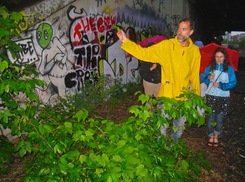 Last week we went on an edible plant walk through our neighborhood. It was hosted by David Craft, whose book, Urban Foraging, details the produce he collects around Boston. He started out the evening by feeding us all black locust blossoms. It was bizarre pulling them off the branch and popping them right in my mouth, but they tasted sweet, like pea shoots.
Last week we went on an edible plant walk through our neighborhood. It was hosted by David Craft, whose book, Urban Foraging, details the produce he collects around Boston. He started out the evening by feeding us all black locust blossoms. It was bizarre pulling them off the branch and popping them right in my mouth, but they tasted sweet, like pea shoots.
Foraging obviously isn’t an efficient way of getting food, but it would be nice to be able to recognize plants as you walk past and just gather a handful for dinner. Also, it seems like most should be collected when they’re young, in the early spring. At that point most farmer’s markets haven’t started yet, so it’s a nice way to get super local food when it’s not otherwise easily available. And I have to admit to the urge to grab handfuls of berries from my neighbors’ yards.
On the other hand, in the city I would be worried about contamination. I’ve read that plants don’t absorb heavy metals in high concentrations, so it’s ingesting the dirt on the outside that’s the main problem. A thorough washing takes care of that. But who knows what pesticides have been sprayed on them and how much they retain? Probably less than conventional produce, but what’s a good rule of thumb? None of the urban foragers I’ve read deal with that, except to tell you to avoid highways. I’m going to keep researching, but if anyone has some insight to share, please do!
In the meantime, I’m going to get a good field guide so that I can identify edible plants, even if I’m not up to eating them yet. David’s book is more of a primer on the subject.
Cross-posted on pragmaticenvironmentalism.com